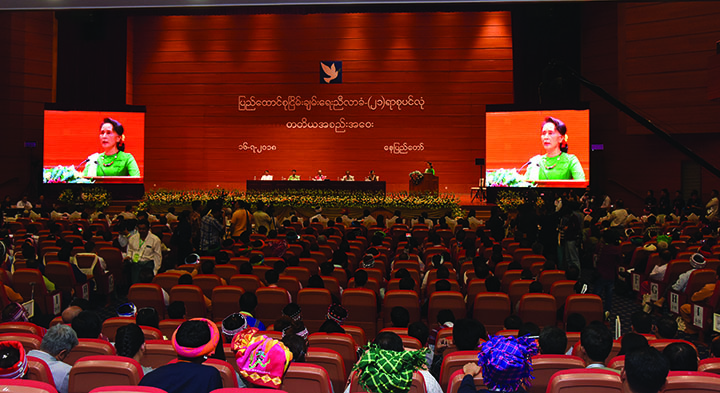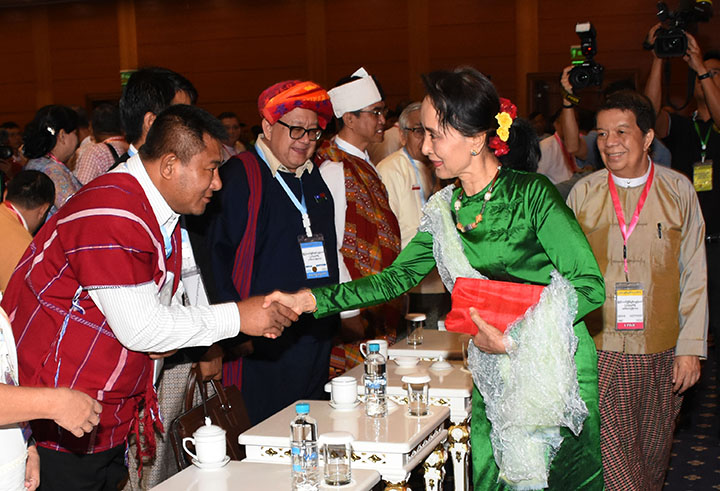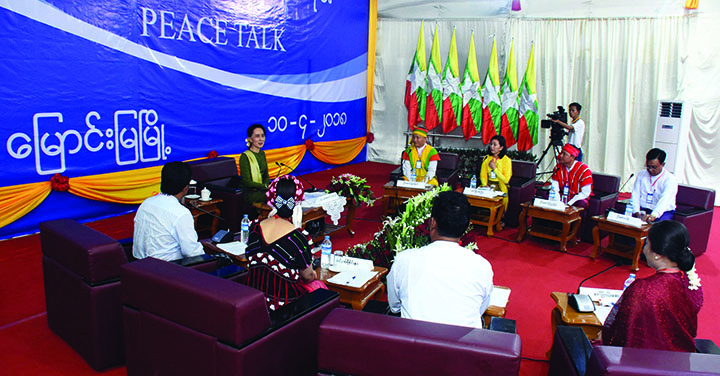“The main focus is national reconciliation and the stability and development of Rakhine State. The National Reconciliation and Peace Center has been formed to bring about national unity and harmony in a pragmatic and effective manner. The center is being chaired by Daw Aung San Suu Kyi.”
Deputy Minister U Khin Maung Tin
- By May Oo Moe
Photo by Ko Ko Soe Nyunt
Just days after the inception of the new Government, a first draft bill was signed into law, creating the post of the State Counsellor for Daw Aung San Suu Kyi in the new cabinet.
The bill was passed by the Amyotha Hluttaw (Upper House) on 1April and by the Pyithu Hluttaw (Lower House) on 5 April, and enacted on 6 April 2016.
The bill was drawn up with the four objectives as national tasks (1) a multi-party democratic system; (2) a market economic system; (3) a federal Union; and (4) peace and development in the Union.
Coordinating and linking up the policies and directives envisioned by the State Counsellor, the Ministry of the State Counsellor Office was born to serve interests of the State.
It is fair enough to say that the tasks being implemented by the Ministry of the State Counsellor Office is connection with the imagination and creativity of the State Counsellor.
Ultimate goal and destination aspired by the nation happened to be (a) Peace; (b) Prosperity; and (c) Democracy (PPD), such as that of the peace in the nation; that of the prosperity of the nation; and that of the building of democratic federal union. The tasks are knotted with each other, and that the pre-requisite to achieve these lofty strong desires is mainly depends on smooth, swift and subtle working conditions.
Wrapping up in a package, the Ministry of the State Counsellor Office is embracing all the tasks in its loop.
Priority tasks in peace process
Deputy Minister U Khin Maung Tin of the Ministry of the State Counsellor Office said that, “The main focus is national reconciliation and the stability and development of Rakhine State. The National Reconciliation and Peace Center has been formed to bring about national unity and harmony in a pragmatic and effective manner. The center is being chaired by Daw Aung San Suu Kyi.”
The Peace Commission was formed with the aim of facilitating the ongoing peace talks.
The Nationwide Ceasefire Agreement (NCA) was a landmark ceasefire agreement between the government of Myanmar and representatives of various ethnic armed groups, officially known as “ethnic armed organizations” (EAOs) by the government. The draft was agreed upon by a majority of the invited parties on 31 March 2015.

It is worthy to note that striving towards participation of all NCA non-signatory EAOs; and to continue discussion under the agreements included in the NCA when working toward strengthening the ceasefire.
The 14th Union Peace Dialogue Joint Committee (UPDJC) meeting was held at the National Reconciliation and Peace Centre (NRPC) in Nay Pyi Taw in February.
UPDJC is leading the political dialogues to resolve and end armed conflict in the country, and ending the armed conflict in the country depends on political agreement. As the policy on federal matters can only be laid when political dialogues are successful, UPDJC is in a sector that is very important to keep peace in the union.
At the 12th UPDJC meeting, the attendees decided the topics to be discussed during the Union Peace Conference-21st Century Panglong 3rd session.
The Nationwide Ceasefire Agreement (NCA) signed on 15 October 2015 by the Union of Myanmar Government and 8 Ethnic Armed Organizations created two major joint bodies: the Joint Ceasefire Monitoring Committee (JMC) and the Union Peace Dialogue Joint Committee (UPJDC). The JMC includes union, state and local levels to implement ceasefire monitoring at different levels.
JMC-U, in order to implement its function has established Technical Secretariat Center (TSC). TSC shall be a technical body to advise and support the JMC to oversee, coordinate and integrate the implementation of the Nationwide Ceasefire Agreement; the Military Code of Conduct; the Terms of Reference of the Joint Monitoring Committee.
Due to continuous dialogues and discussions among the signatories of NCA, most of the disagreements have been reduced, and the ceasefire process has achieved success.
The Union Peace Conference – 21st Century Panglong
The Union Peace Conference – 21st Century Panglong was a peace conference held from 31 August to 3 September 2016 at the Myanmar Convention Centre 2 in Nay Pyi Daw, Myanmar. Ban Ki-moon, the Secretary-General of the United Nations, also attended the opening ceremony. The ethnic armed organizations (EAOs) that have signed the NCA attended the conference and the leaders of non-signatories armed ethnic groups were also seen at the conference.
The second Union Peace Conference – 21st Century Panglong was held from 24 to 29 May 2017, and with all inclusive principle was in the mainstay for political dialogue. Total of 700 participants attended the conference such as the government, Tatmadaw, Hluttaw and delegates from EAQs.
Political observations and proposals being compiled by the UPDJC were submitted to Panglong Conference. Subsequently, the agreements approved by the Union Peace Conference—21st Century Panglong 2nd session were signed as a part of the Pyidaungsu Accord.
Pyidaungsu Accord
1/ Looking forward to non-disintegration of the Union, non-disintegration of national solidarity and perpetuation of the sovereignty, based on freedom, equality and justice, the Union Peace Conference—21st Century Panglong 2nd session was held at Nay Pyi Taw from 24th May 2017 to 29th May 2017 for building up the Union in harmony with the Panglong spirit, based on democracy and federalism which guarantee democracy, national equality and self-determination, in accord with the outcomes of the political dialogues.
2/ In this Conference, proposals acquired from discussions at different levels made in groups or in sectors over principles and proposals submitted by Union Peace Dialogues Joint Committee have been agreed as part of the Pyidaungsu Accord.
3/ Part 1 of the Pyidaungsu Accord approved and signed in this conference and further parts of the agreements to be achieved in imminent different levels are to be combined to be signed as the Pyidaungsu Accord.
4/ Part 1 of the Pyidaungsu Accord signed in this conference has
(A) 12 agreements on principles of political sector,
(B) 11 agreements on principles of economic sector,
(C) 4 agreements on principles of social sector,
(D) 10 agreements on principles of land and natural environment sector, altogether 37 agreements. These are described in Appendix—(A) (B) (C) & (D).
5/ The above-said agreements have been signed by group leaders and witnesses in the Union Peace Conference—21st Century Panglong 2nd session as the part 1 of Pyidaungsu Accord under clause 20(E) of the Nationwide Ceasefire Agreement.
The Third Union Peace Conference – 21st Century Panglong was held from 11 to 16 July 2018, and with all inclusive principle was in the mainstay for political dialogue. Total of 700 participants attended the conference such as the government, Tatmadaw, Hluttaw and delegates from EAQs.
14 points signed as Part II of Union Accord
14 points approved by the Third Session of the Union Peace Conference-21st Century Panglong were signed as a Part II of the Union Accord. Following are the 14 points, and signatures of the leaders of the respective groups and witnesses.
Union Accord Part II
1. Aiming toward non-disintegration of the Union, non-disintegration of national solidarity and perpetuation of sovereignty, based on freedom, equality and justice and in accordance with the Panglong spirit, the Third Session of the Union Peace Conference-21st Century Panglong was held in Nay Pyi Taw from 11 to 16 July 2018 to establish a Union based on democratic and federal system that assures democracy, national equality and self-determination rights, founded according to the outcomes of the political discussions.
2. At this conference, sector-wise and group-wise meetings were conducted in stages on policy proposals submitted by Union Peace Dialogue Joint Committee (UPDJC) and the proposals obtained were agreed as Part II of the Union Accord.
3. The Part II of the Union Accord signed at this conference and all other agreed sections obtained at the subsequent conferences will be compiled and signed as Union Accord.
4. The Union Accord Part II signed in this conference are –
(a) Four agreements in political sector basic principle
(b) One agreement in economic sector basic principle
(c) Seven agreements in social sector basic principle
(d) Two agreements in land & environment sector basic principle totaling fourteen which are shown in addenda (a), (b), (c) and (d).

Priority given for development of regions
In the conflict zones and unstable areas, provision of food, clothing and shelters for the people have been allocated from the Union Government treasury added with the funds from the National Reconciliation and Peace Center as well as from the well-wishers from the country and abroad.
The Joint Coordination Body (JCB) for Peace Process Funding held a meeting in Nay Pyi Taw, reaching consensus on six issues, including an amendment on the reformation of JCB and fund allowances to the National Reconciliation and Peace Centre (NRPC) and signatories to the Nationwide Ceasefire Agreement (NCA).
Three years journey of NCA
On 13 February 2019, two ethnic armed groups signed the Nationwide Ceasefire Agreement in a move for peace process. The New Mon State Party (MNSP) and Lahu Democratic Union (LDU) inked the NCA in Nay Pyi Taw, joining eight other groups who had signed.
Union Government and NCA (Nationwide Ceasefire Agreement) Signatory EAOs (Ethnic Armed Organizations) leaders held a special meeting in Nay Pyi Taw from 15 to 16 October 2018.
Round Table Discussions on Peace
The State Counsellor believes that the essence of peace and fruits of peace are meant for the upcoming generation. During the third year term, the State Counsellor held roundtable talks with the public in Myaungmya, Ayeyawaddy region on 10 April 2018; in Mawlamyaing, Mon State on 14 June 2018; in Pakokku, Magway Region on 9 August 2018.
Emphasis given to Rakhine State
The Deputy Minister of the Ministry said that emphasis is being given to issues on Rakhine State for stability and development, which is related and critical with the stability in the whole of the country.
Therefore, on 30 May 2016, Government formed a Central Committee for the Implementation of Peace and Development in Rakhine State with State Counsellor Daw Aung San Suu Kyi as chairperson. At the behest of the Ministry of the Office of the State Counsellor of the Republic of the Union of Myanmar and in collaboration with the Kofi Annan Foundation, the Advisory Commission on Rakhine State was founded on 24 August 2016 as a neutral and impartial body which aimed to propose concrete measures for improving the welfare of all people in Rakhine state.
To probe into the background situations that led to violent attacks that occurred on 9 October and 12-13 of November in Maungtaw, Rakhine State and the truth about the incidents, and to investigate whether existing laws, rules and regulations were observed in taking measures to avoid similar incidents in the future before making recommendations.
The Investigation Committee has been formed, chaired by Vice President U Myint Swe on 1 December 2016.
The Committee for Implementation of the Recommendations on Rakhine State was formed and led by Union Minister for Social Welfare, Relief and Resettlement on October 9, 2017.
In order for the Union Government, the people, the private sector and local NGOs, CSOs, partner nations, UN agencies and INGOs, to implement the projects in all sectors for the development of Rakhine State in cooperation, a Committee for the Union Enterprise for Humanitarian Assistance, Resettlement and Development in Rakhine has been established on 17 October 2017.
The above-mentioned notification provides for the formation of an advisory board with the local, regional and international experts, as well as experienced individuals to provide necessary advice for the effective implementation of the recommendations of the Advisory Commission on Rakhine State based on the situation on the ground.3. Accordingly, the Advisory Board for the “Committee for Implementation of the Recommendations on Rakhine State’ has been established Chaired by Dr. Surakiart Sathirathai. The Task Force led by the Deputy Minister for the Occice of State Counsellor was formed on 7 January 2018.
Independent Commission of Enquiry (ICOE) led by Chairperson Ambassador Rosario Manalo was established on 30 July 2018.
Start of the repatriation process
Various agreement have been signed among Myanmar Government, the UNHCR and the UNDP such as that of MoU on Establishment of Border Liaison Office- BLOs; MoU on Security Dialogue and Cooperation ; Arrangement on Return of Displaced Persons from Rakhine State; Joint Working Group(JWG); ToR ; Physical Arrangement for Repatriation of Displaced Myanmar Residents From Bangladesh Under The Arrangement on Return of Displaced Persons from Rakhine State. The meeting on the first Joint Working Group (JWG) was held in January 2018. The meeting on consular matters has been held on 31 October 2018.
The list of persons to be repatriated back have been scrutinized by both sides on beginning February 2018; and that on the part of Myanmar side, the proper verification have been made and officially returned the lists on 22 occasions to the Bangladeshi side from 14 March 2018 to 27 December 2018.
At the third JWG meeting, the Bangladeshi side has forwarded a list comprising 22,432 persons, and that Myanmar side made proper verification. It is found that 6257 person resided inside Myanmar from 26 November 2018 to 13 February 2019; 14 persons listed as ARSA terrorists; 2490 persons in undocumented status. In connection with the Rakhine issue, Myanmar is working in cooperation with UNSG’s Special Envoy Ms. Christine Schraner Burgener. The workshop on the closure of IDP camps was held in Nay Pyi Taw.
The Deputy Minister of the ministry is of the view that the situation in Rakhine is sensitive and fragile, and therefore, the issues have been handled with care. The incumbent Government is trying the best in solving the problem, and it also needs positive endorsements and supports. So that we need a sustainable solution should be created for implementation.
Translated by UMT (Ahlone)



